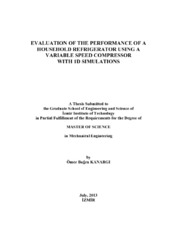Please use this identifier to cite or link to this item:
https://hdl.handle.net/11147/3611| Title: | Evaluation of the Performance of a Household Refrigerator Using a Variable Speed Compressor With 1d Simulations | Authors: | Kanargı, Ömer Buğra | Advisors: | Özkol, Ünver | Keywords: | Energy saving | Publisher: | Izmir Institute of Technology | Abstract: | Inefficient use of electricity is considered as an indirect contributor to the emission of greenhouse gases into the atmosphere. One way to reduce these emissions is to improve the energy conversion efficiencies of the electric equipment. The household refrigerators are designed to satisfy the maximum cooling load to which they are exposed. However, they operate under part load conditions for most of their lifetime. In the literature, some refrigeration capacity control methods are presented such as on/off control, hot gas bypass, evaporator temperature control, clearance volume control, multiple compressor control, cylinder unloading and the variable speed compressor (VSC) control. VSC control has been reported to be the most useful refrigeration capacity modulation method in many studies in terms of its ability to match the refrigeration capacity to the instantaneous cooling load while at the same time decreasing the average and instantaneous power requirements, therefore the total energy consumption (EC) of a refrigerator. In this thesis, three different VSC control algorithms are studied utilizing the 1D model of a commercial household refrigerator. The ECs and the cooling performances are compared with those of the standard on/off compressor control algorithm at the nominal frequency of 50 Hertz (Hz). Temperature management of the cold store and the freezer compartments are investigated in detail, considering the regulations on household refrigerating appliances, characteristics and test methods declared by the British Standards Institute. In addition to the standard EC calculations during the steady state operating conditions, the performances of the VSC control algorithms are evaluated under transient cooling load conditions, as well. It is shown that using a VSC control algorithm to modulate the refrigeration capacity of a refrigerator, when the refrigerator operates under part load conditions, could provide considerable energy savings. | Description: | Thesis (Master)--Izmir Institute of Technology, Mechanical Engineering, Izmir, 2013 Includes bibliographical references (leaves: 104-106) Text in English; Abstract: Turkish and English xii, 106 leaves Full text release delayed at author's request until 2015.07.10 |
URI: | http://hdl.handle.net/11147/3611 |
| Appears in Collections: | Master Degree / Yüksek Lisans Tezleri |
Files in This Item:
| File | Description | Size | Format | |
|---|---|---|---|---|
| 10006891.pdf | MasterThesis | 4.4 MB | Adobe PDF |  View/Open |
CORE Recommender
Items in GCRIS Repository are protected by copyright, with all rights reserved, unless otherwise indicated.